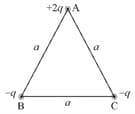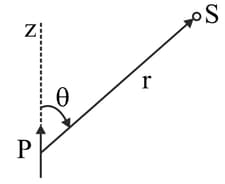Embibe Experts Solutions for Chapter: Electric Charges and Fields, Exercise 1: Exercise
Embibe Experts Physics Solutions for Exercise - Embibe Experts Solutions for Chapter: Electric Charges and Fields, Exercise 1: Exercise
Attempt the free practice questions on Chapter 4: Electric Charges and Fields, Exercise 1: Exercise with hints and solutions to strengthen your understanding. Physics Crash Course (Based on Revised Syllabus-2023) solutions are prepared by Experienced Embibe Experts.
Questions from Embibe Experts Solutions for Chapter: Electric Charges and Fields, Exercise 1: Exercise with Hints & Solutions
Two small spheres 18cm apart have equal negative charges and repel each other with the force . Find the total charge on two spheres.
Two charged particles having charge each are joined by an insulating string of length and the system is kept on a smooth horizontal table. Find the tension in the string.
Two small sphere, each having a mass of , are suspended from a common point by two insulating strings of length each. The spheres are identically charged and the separation between the balls at equilibrium is found to be . Find the charge on each sphere.
A particle having a charge of is placed directly below and at a separation of from the bob of a simple pendulum at rest. The mass of the bob is . What charge should the bob be given so that the string becomes loose?
An electric charge is divided into two part and which then are kept at a distance apart. What will be the condition for the force between them to be maximum.
Three charges are are placed at the vertices and respectively of an equilateral triangle of side . Find the magnitude of dipole moment of this system.

Demonstrate that the potential of the field generated by a dipole, with electric moment , may be represented as , where is the radius vector. Using this expression, find the magnitude of the electric field strength vector as a function of and .

Each of the two long parallel threads carry a uniform charge per unit length. The threads are separated by a distance . Find the maximum magnitude of the electric field strength in the symmetry plane of this system, located between the threads.
